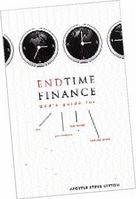
Pastor Steve Lyston - Rudolph Brown/Chief Photographer
Book: End Time Finance - God's Guide for You, Your Business, Your Church and Your Nation by Apostle Steve Lyston.
Publisher: Tate Publishing and Enterprises LLC.
Reviewer: Dr Eric L. Henry, associate professor of religion, Northern Caribbean University.

Lyston has produced a very informative work on end-time finance. In other words, he is looking at individual, organisational, institutional and national financial state as predicted by Scripture.
The strength of Lyston's book is the great effort made to have scriptural authority backing all his suggestions.
One might not agree with all his exegetical suggestions but his usage of scripture serves very well in stimulating thoughts. Lyston has not made any promises which he has not fulfilled. The driving force to his book can be found in the first three paragraphs of the foreword to the book
It has been God's plan for mankind that we walk in the authority and dominion He has given us - that all would come into closer relationship with Him so that He can reveal His mysteries, secrets and solutions to us.
Unlocking secrets
This book unlocks some of those secrets and opens up the word of God in a remarkable way; such that it brings further divine revelation to the reader and a deeper understanding of the word of God.
It also lends itself to bringing greater balance between, and understanding of the spiritual and natural facets of our existence. (P.15)
The book addresses vital issues like prosperity (chapter one). This chapter shows that while there are prescribed rules and set laws for prosperity (e.g. on P. 23-using Ecclesiastes 3, he tells the readers that "there is a time for everything"), yet it is made clear that there is a vital human involvement which is necessary to bring about the desired prosperity. Through chapter one he spent time showing his readers, from Scripture, some of the things which will surely hinder God's blessings and things which will ensure God's blessings.
While I am not convinced that it is our giving which moves God to bless humanity, but rather that God has already blessed humanity in every way, yet it remains true that our giving speaks to our appreciation of God and ensures further engagement with the divine.
Lyston has brought out, in his book, the great importance of giving as a means of ensuring what amounts to a divine connection, a connection with the eternal cosmos and a connection with humanity.
Although he places great emphases on giving as a vital part of one's existence and growth, it does not make his book a "piece of begging device". His emphasis is not on "give to my ministry". He strongly recommends that one should give when impressed by the Holy Spirit. And one gives to the individual or the institution which the Holy Spirit impresses upon one's mind. This removes any idea of a selfish "after-my-money" attitude, and will help the reader to grasp the principles he is trying to communicate.
I believe Lyston has managed to put together a very worthwhile chapter on the concept of tithing. One or two areas might need a little more clarification. But, as was suggested earlier, it provides exceptionally good stimulation for the readers to be involved and to make further investigations.
It is remarkable how Lyston manages to show, from the Bible, how nearly everything we do, as individuals, as business concerns, as a nation, even as a church, affects us materially, socially, intellectually and spiritually.
One part I am especially thrilled with is where he attempts to remove the theological 'blinkers' from the eyes of those who seem to think that Christians are not to make effort to have material blessings. On Page 61 he writes:
"When you have money, you will be able to do more for the Lord through evangelism; the prophetic voice will come forth, and you can't be a blessing to others until you are blessed not only spiritually, but also financially."
In the same context, Lyson also encourages his readers to be investment conscious. No one portion of money just placed on the shelves will bring satisfaction and prove useful - investment is necessary. (Read Pages 62 to 66).
Lyston uses the Bible characters like Noah, Abraham and others to show the divine/human connection and what principles can be applied to bring about a constant flow of blessings.
If readers do not allow the shortfalls of the book to prejudice their minds against the intended message, this book can be of great benefit.
Something I am quite sure the author will do to enhance the readers' love of the book will be things like putting page number to the Table of Contents and giving precision to editorial matters.
For people, Christians and non-Christians, who are genuinely concerned about their stewardship existence, this book will enhance the concept of stewardship, and make each reader a better stewardship practitioner and teacher.

